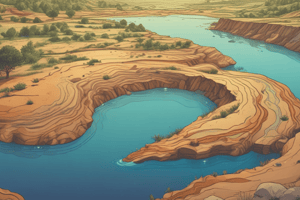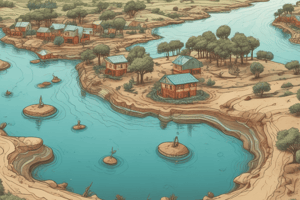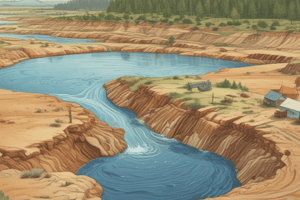Podcast
Questions and Answers
Why is groundwater considered a vulnerable resource?
Why is groundwater considered a vulnerable resource?
Groundwater is considered a vulnerable resource because it is not easily accessible for testing, regulating, and cleaning, and it can be easily polluted.
What percentage of Earth's population relies on groundwater for its needs?
What percentage of Earth's population relies on groundwater for its needs?
Over 1/3 of Earth's population relies on groundwater for its needs.
What are some sources of groundwater pollution?
What are some sources of groundwater pollution?
Groundwater pollution can come from sources such as fertilizers, pesticides, herbicides, toxic chemicals from manufacturing industries, and leakage from underground storage tanks.
Why are nitrates from fertilizers particularly dangerous in drinking water?
Why are nitrates from fertilizers particularly dangerous in drinking water?
What are some examples of substances that can leach into groundwater from improperly disposed manufacturing waste?
What are some examples of substances that can leach into groundwater from improperly disposed manufacturing waste?
What are the potential consequences of overdrawn groundwater?
What are the potential consequences of overdrawn groundwater?
Why is groundwater depleted faster than surface water?
Why is groundwater depleted faster than surface water?
What is the similarity between aquifers and a bank account?
What is the similarity between aquifers and a bank account?
What is subsidence and how does it relate to overdrawn groundwater?
What is subsidence and how does it relate to overdrawn groundwater?
Which city has experienced significant subsidence due to overdrawn groundwater?
Which city has experienced significant subsidence due to overdrawn groundwater?
Flashcards are hidden until you start studying
Study Notes
Importance of Groundwater
- Groundwater is a crucial natural resource, serving as a primary water source for drinking, household purposes, and agricultural irrigation.
- Over 1/3 of the global population relies on groundwater, with 99% of the rural population in the U.S. depending on it.
Vulnerability of Groundwater
- Groundwater is at risk from environmental issues similar to surface water but is more challenging to test and regulate since it is underground.
- Its movement underground contributes to its vulnerability; it has pathways to discharge into lakes, rivers, and oceans.
Sources of Groundwater Pollution
- Groundwater pollution can result from various sources, particularly when harmful substances penetrate the soil.
- Rainwater can draw harmful elements from the surface down into aquifers, similar to how hot water extracts flavors from coffee.
- Agriculture significantly contributes to pollution through fertilizers, pesticides, and herbicides, with nitrates causing health risks such as cancers and birth defects in drinking water.
Industrial Impact
- Manufacturing industries pose a threat to groundwater, as improperly disposed toxic chemicals can leach into the soil and contaminate water supplies.
- Underground storage tanks, including septic systems, can leak hazardous materials into the ground.
Overdrawing Groundwater
- Groundwater is extracted more rapidly than it can naturally replenish, particularly for drinking and agricultural irrigation.
- The analogy of a bank account illustrates the unsustainable withdrawal of groundwater, where deposits (recharges) do not match withdrawals.
- The result of excessive extraction can lead to saltwater intrusion in coastal aquifers, compromising the available drinking water.
Consequences of Overuse
- Subsidence occurs when groundwater is removed too quickly, causing the ground to settle and create voids beneath the surface.
- This phenomenon can manifest as small sinkholes or affect large areas, leading to significant ground deformation.
- Mexico City has experienced substantial subsidence, sinking over 33 feet, resulting in infrastructural issues such as broken pipes and tilted buildings.
Studying That Suits You
Use AI to generate personalized quizzes and flashcards to suit your learning preferences.




